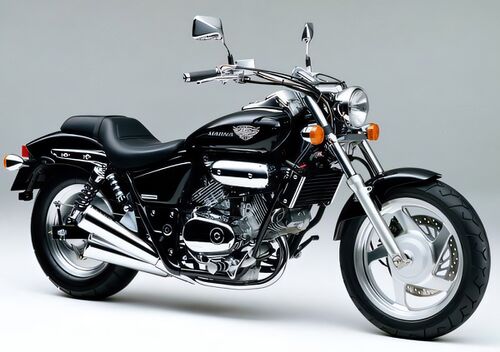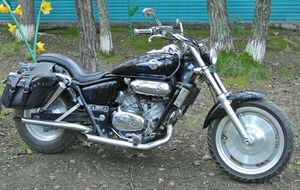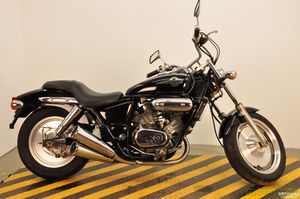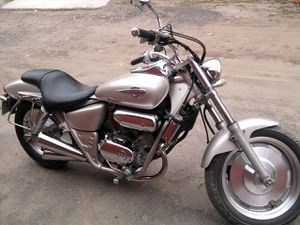Difference between revisions of "Honda Magna 250"
m |
m |
||
| Line 1: | Line 1: | ||
| − | {{DISPLAYTITLE:Honda Magna 250 | + | {{DISPLAYTITLE: Honda Magna 250}} |
| − | |||
| − | |||
| − | |||
| − | }} | ||
__notoc__ | __notoc__ | ||
| − | [[file:Vt250c mod1.jpg|500px|center|Honda Magna 250]] | + | [[file: Vt250c mod1.jpg | 500px | center | Honda Magna 250]] |
| − | + | The Honda Magna 250 cruiser model was first presented at the 30th Tokyo Motor Show in 1993, and official sales began in 1994. The model was focused primarily on the domestic Japanese market, but was also supplied to Australia. In the Japanese market, the Magna 250 model gained immense popularity and even took the 1st place in sales of motorcycles with an engine capacity of 250 cc. | |
{{Ads_top}} | {{Ads_top}} | ||
| − | + | The motorcycle is also known by the following names: | |
| − | * '''Honda V-Twin Magna''' - | + | * '''Honda V-Twin Magna''' - this is what Honda called this model in the Japanese market. |
| − | * '''Honda Magna 250''' - | + | * '''Honda Magna 250''' - the model was not officially called that, however, it is sold under this name at Japanese auctions. |
| − | * '''Honda VT250C V-Twin Custom''' | + | * '''Honda VT250C V-Twin Custom''' is the name for overseas markets, in particular for the Australian market. |
| − | + | The model was based on a 2-cylinder V-shaped liquid-cooled engine from the [[Honda_VT250_Spada | Honda VT250 Spada]], which was slightly reconfigured and received different carburetors. This significantly reduced the maximum power (to 27 hp), but increased the torque characteristic, making it fully available at 7500 rpm (from [[Honda_VT250_Spada | Spada]] - at 9000 rpm). | |
| − | + | In 1996, a replenishment of the Magna 250 line appears - '''' Honda Magna 250S ''. The official model name is '''Honda V-Twin Magna S'''. The modification is distinguished by an almost monolithic front wheel, rear shock absorbers with chrome pads and the presence of an alarm button. This model was produced in 1996 and 1997, after which it was discontinued and was no longer offered. | |
| − | 2006 | + | 2006 was the last year for the Magna 250, after which it was dropped from Honda's line of motorcycles. The removal from the production line was due to the release in 2007 of updated environmental standards, which the motorcycle engine did not comply with. Currently, the model is present in large quantities at Japanese auctions and is in certain demand in Russia as the first motorcycle for novice drivers and girls. |
| − | " | + | The "big brother" of the model is [[Honda_Magna_750_ (V45) | Honda Magna 750 (V45)]]. |
| − | '' | + | '' The main competitors of the Honda Magna 250 in the class: '' |
| − | * [[Yamaha_XV250_Virago|Yamaha XV250 Virago]] | + | * [[Yamaha_XV250_Virago | Yamaha XV250 Virago]] |
| − | * [[Kawasaki_VN250_Eliminator|Kawasaki VN250 Eliminator]] / [[Kawasaki_EL250_Eliminator|Kawasaki EL250 Eliminator]] | + | * [[Kawasaki_VN250_Eliminator | Kawasaki VN250 Eliminator]] / [[Kawasaki_EL250_Eliminator | Kawasaki EL250 Eliminator]] |
| − | * [[Suzuki_GZ250_Marauder|Suzuki GZ250 Marauder]] | + | * [[Suzuki_GZ250_Marauder | Suzuki GZ250 Marauder]] |
| − | == | + | == Photos == |
| − | {| align="center" border="0" | + | {| align = "center" border = "0" |
| − | + | | [[Image: 4dc9c6db2ada50080959b4629de3d4d5.jpg | 300px | thumb | Honda Magna 250S]] | |
| − | + | | [[Image: 1469297545 1469297402706.jpg | 300px | thumb | Honda Magna 250S]] | |
| − | + | | [[Image: LHpzRWMOvrs.jpg | 300px | thumb | Honda Magna 250S]] | |
| − | |||
| − | |[[Image:4dc9c6db2ada50080959b4629de3d4d5.jpg|300px|thumb|Honda Magna 250S]] | ||
| − | |[[Image:1469297545 1469297402706.jpg|300px|thumb|Honda Magna 250S]] | ||
| − | |[[Image:LHpzRWMOvrs.jpg|300px|thumb|Honda Magna 250S]] | ||
|- | |- | ||
|} | |} | ||
| Line 41: | Line 33: | ||
{{Ads_post}} | {{Ads_post}} | ||
| − | == | + | == Specifications == |
| − | + | Specifications Honda Magna 250: | |
| − | {| class="wikitable" | + | {| class = "wikitable" |
| − | ! scope="row"| | + | ! scope = "row" | Model |
| − | |Honda Magna 250 (Honda V-Twin Magna) | + | | Honda Magna 250 (Honda V-Twin Magna) |
|- | |- | ||
| − | ! scope="row"| | + | ! scope = "row" | Motorcycle type |
| − | | | + | | cruiser |
|- | |- | ||
| − | ! scope="row"| | + | ! scope = "row" | Release year |
| − | |1994-2006 | + | | 1994-2006 |
|- | |- | ||
| − | ! scope="row"| | + | ! scope = "row" | Frame |
| − | | | + | | steel tubular |
|- | |- | ||
| − | ! scope="row"| | + | ! scope = "row" | Engine type |
| − | |2- | + | | 2-cylinder, 4-stroke, V-shaped |
|- | |- | ||
| − | ! scope="row"| | + | ! scope = "row" | Working volume |
| − | |245 | + | | 245 cm³ |
|- | |- | ||
| − | ! scope="row"| | + | ! scope = "row" | Bore / stroke |
| − | |60 | + | | 60.0 x 44.1 mm |
|- | |- | ||
| − | ! scope="row"| | + | ! scope = "row" | Compression ratio |
| − | |11.0:1 | + | | 11.0: 1 |
|- | |- | ||
| − | ! scope="row"| | + | ! scope = "row" | Cooling |
| − | | | + | | liquid |
|- | |- | ||
| − | ! scope="row"| | + | ! scope = "row" | Number of valves per cylinder |
| − | |DOHC, 4 | + | | DOHC, 4 valves per cylinder |
|- | |- | ||
| − | ! scope="row"| | + | ! scope = "row" | Fuel supply system |
| − | | | + | | carburetor, 2x Keihin 32 mm (VDD2) |
|- | |- | ||
| − | ! scope="row"| | + | ! scope = "row" | Ignition type |
| − | | | + | | transistor |
|- | |- | ||
| − | ! scope="row"| | + | ! scope = "row" | Maximum power |
| − | |27 | + | | 27.0 h.p. (20.0 kW) at 10,000 rpm |
|- | |- | ||
| − | ! scope="row"| | + | ! scope = "row" | Maximum torque |
| − | |22 | + | | 22.0 Nm (2.3 kg-m) @ 7500 rpm |
|- | |- | ||
| − | ! scope="row"| | + | ! scope = "row" | Gearbox |
| − | |5- | + | | 5-speed |
|- | |- | ||
| − | ! scope="row"| | + | ! scope = "row" | Drive type |
| − | | | + | | chain |
|- | |- | ||
| − | ! scope="row"| | + | ! scope = "row" | Front tire size |
| − | |120/80-17 (61S) | + | | 120 / 80-17 (61S) |
|- | |- | ||
| − | ! scope="row"| | + | ! scope = "row" | Rear tire size |
| − | |150/80-15 M/C (70S) | + | | 150 / 80-15 M / C (70S) |
|- | |- | ||
| − | ! scope="row"| | + | ! scope = "row" | Front brakes |
| − | |1 | + | | 1 disc, 2-piston caliper |
|- | |- | ||
| − | ! scope="row"| | + | ! scope = "row" | Rear brakes |
| − | | | + | | drum, 160 mm |
|- | |- | ||
| − | ! scope="row"| | + | ! scope = "row" | Front suspension |
| − | | | + | | 41mm telescopic fork, 150mm travel |
|- | |- | ||
| − | ! scope="row"| | + | ! scope = "row" | Rear suspension |
| − | | | + | | linkage with two shock absorbers |
|- | |- | ||
| − | ! scope="row"| | + | ! scope = "row" | Motorcycle length |
| − | |2315 | + | | 2315 mm |
|- | |- | ||
| − | ! scope="row"| | + | ! scope = "row" | Motorcycle width |
| − | |880 | + | | 880 mm |
|- | |- | ||
| − | ! scope="row"| | + | ! scope = "row" | Motorcycle height |
| − | |1065 | + | | 1065 mm |
|- | |- | ||
| − | ! scope="row"| | + | ! scope = "row" | Wheelbase |
| − | |1620 | + | | 1620 mm |
|- | |- | ||
| − | ! scope="row"| | + | ! scope = "row" | Saddle height |
| − | |690 | + | | 690 mm |
|- | |- | ||
| − | ! scope="row"| | + | ! scope = "row" | Acceleration to 100 km / h |
| | | | ||
|- | |- | ||
| − | ! scope="row"| | + | ! scope = "row" | Maximum speed |
| − | |140 | + | | 140 km / h |
|- | |- | ||
| − | ! scope="row"| | + | ! scope = "row" | Fuel tank capacity |
| − | |11 | + | | 11.0 l |
|- | |- | ||
| − | ! scope="row"| | + | ! scope = "row" | Motorcycle weight (dry) |
| − | |171 | + | | 171 kg |
|- | |- | ||
| − | ! scope="row"| | + | ! scope = "row" | Motorcycle weight (curb) |
| − | |183 | + | | 183 kg |
|- | |- | ||
|} | |} | ||
| − | == | + | == Fuel consumption == |
| − | + | The officially declared fuel consumption of the Honda Magna 250 is 2.94 liters per 100 kilometers (when driving at a constant speed of 60 km / h). The exact value depends on the riding style. | |
| − | |||
== Документация == | == Документация == | ||
* [[Honda_Magna_250:_manuals|Honda Magna 250: manuals]] | * [[Honda_Magna_250:_manuals|Honda Magna 250: manuals]] | ||
Revision as of 21:38, 11 August 2021
The Honda Magna 250 cruiser model was first presented at the 30th Tokyo Motor Show in 1993, and official sales began in 1994. The model was focused primarily on the domestic Japanese market, but was also supplied to Australia. In the Japanese market, the Magna 250 model gained immense popularity and even took the 1st place in sales of motorcycles with an engine capacity of 250 cc.
The motorcycle is also known by the following names:
- Honda V-Twin Magna - this is what Honda called this model in the Japanese market.
- Honda Magna 250 - the model was not officially called that, however, it is sold under this name at Japanese auctions.
- Honda VT250C V-Twin Custom is the name for overseas markets, in particular for the Australian market.
The model was based on a 2-cylinder V-shaped liquid-cooled engine from the Honda VT250 Spada, which was slightly reconfigured and received different carburetors. This significantly reduced the maximum power (to 27 hp), but increased the torque characteristic, making it fully available at 7500 rpm (from Spada - at 9000 rpm).
In 1996, a replenishment of the Magna 250 line appears - '' Honda Magna 250S . The official model name is Honda V-Twin Magna S. The modification is distinguished by an almost monolithic front wheel, rear shock absorbers with chrome pads and the presence of an alarm button. This model was produced in 1996 and 1997, after which it was discontinued and was no longer offered.
2006 was the last year for the Magna 250, after which it was dropped from Honda's line of motorcycles. The removal from the production line was due to the release in 2007 of updated environmental standards, which the motorcycle engine did not comply with. Currently, the model is present in large quantities at Japanese auctions and is in certain demand in Russia as the first motorcycle for novice drivers and girls.
The "big brother" of the model is Honda Magna 750 (V45).
The main competitors of the Honda Magna 250 in the class:
Photos
Specifications
Specifications Honda Magna 250:
| Model | Honda Magna 250 (Honda V-Twin Magna) |
|---|---|
| Motorcycle type | cruiser |
| Release year | 1994-2006 |
| Frame | steel tubular |
| Engine type | 2-cylinder, 4-stroke, V-shaped |
| Working volume | 245 cm³ |
| Bore / stroke | 60.0 x 44.1 mm |
| Compression ratio | 11.0: 1 |
| Cooling | liquid |
| Number of valves per cylinder | DOHC, 4 valves per cylinder |
| Fuel supply system | carburetor, 2x Keihin 32 mm (VDD2) |
| Ignition type | transistor |
| Maximum power | 27.0 h.p. (20.0 kW) at 10,000 rpm |
| Maximum torque | 22.0 Nm (2.3 kg-m) @ 7500 rpm |
| Gearbox | 5-speed |
| Drive type | chain |
| Front tire size | 120 / 80-17 (61S) |
| Rear tire size | 150 / 80-15 M / C (70S) |
| Front brakes | 1 disc, 2-piston caliper |
| Rear brakes | drum, 160 mm |
| Front suspension | 41mm telescopic fork, 150mm travel |
| Rear suspension | linkage with two shock absorbers |
| Motorcycle length | 2315 mm |
| Motorcycle width | 880 mm |
| Motorcycle height | 1065 mm |
| Wheelbase | 1620 mm |
| Saddle height | 690 mm |
| Acceleration to 100 km / h | |
| Maximum speed | 140 km / h |
| Fuel tank capacity | 11.0 l |
| Motorcycle weight (dry) | 171 kg |
| Motorcycle weight (curb) | 183 kg |
Fuel consumption
The officially declared fuel consumption of the Honda Magna 250 is 2.94 liters per 100 kilometers (when driving at a constant speed of 60 km / h). The exact value depends on the riding style.
Документация



